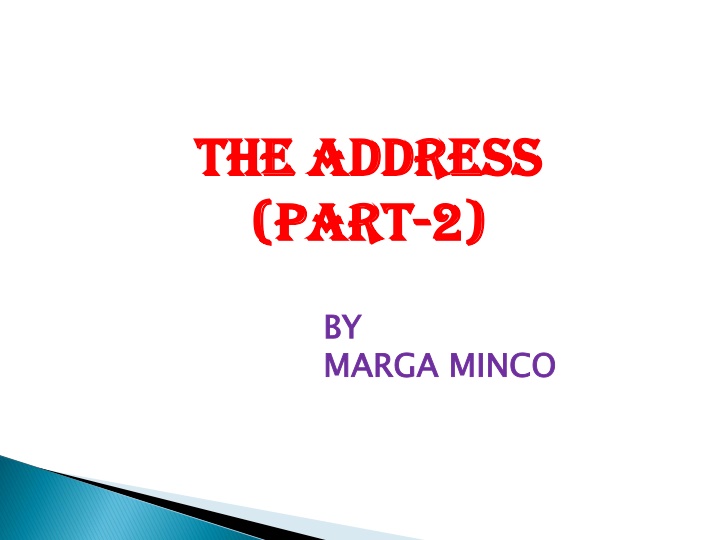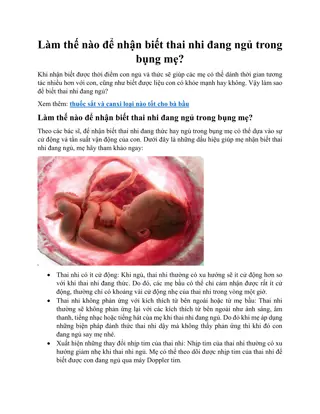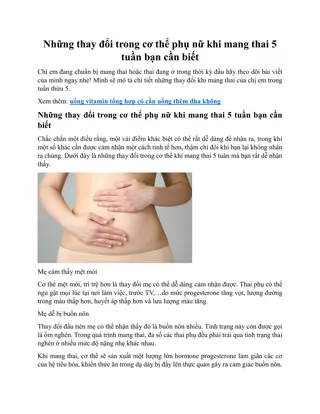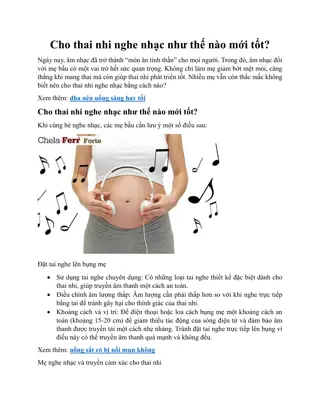The Address - Part 2 by Marga Minco
The story revolves around a rich Jewish lady, Mrs. S, her non-Jewish acquaintance Mrs. Dorling, and the narrator who reflects on changes post-War. Mrs. Dorling takes valuables, creating tension with the narrator's mother. The narrator encounters Mrs. Dorling again, leading to intriguing developments.
Download Presentation

Please find below an Image/Link to download the presentation.
The content on the website is provided AS IS for your information and personal use only. It may not be sold, licensed, or shared on other websites without obtaining consent from the author.If you encounter any issues during the download, it is possible that the publisher has removed the file from their server.
You are allowed to download the files provided on this website for personal or commercial use, subject to the condition that they are used lawfully. All files are the property of their respective owners.
The content on the website is provided AS IS for your information and personal use only. It may not be sold, licensed, or shared on other websites without obtaining consent from the author.
E N D
Presentation Transcript
THE ADDRESS THE ADDRESS (PART (PART- -2) 2) BY MARGA MINCO BY MARGA MINCO
IMPORTANR CHARACTERS IMPORTANR CHARACTERS: : 1. 1.Mrs. S and was a rich lady. Mrs. S belongs to Jews community and was a rich lady. belongs to Jews community 2. 2.Mrs. Dorling Mrs. Dorling was a non was a non- -Jews. Jews. 3. 3.The girl (Narrator), The girl (Narrator), daughter of Mrs. S, daughter of Mrs. S,
THE TEXT As I walked slowly back to the station I thought about my mother, who had given me the address years ago. It had been in the first half of the War. I was home for a few days and it struck me immediately that something or other about the rooms had changed. I missed various things. My mother was surprised I should have noticed so quickly. Then she told me about Mrs Dorling. I had never heard of her but apparently she was an old acquaintance of my mother, whom she hadn t seen for years. She had suddenly turned up and renewed their contact. Since then she had come regularly. Every time she leaves here she takes something home with her, said my mother. She took all the table silver in one go. And then the antique plates that hung there. She had trouble lugging those large vases, and I m worried she got a crick in her back from the crockery. My mother shook her head pityingly. I would never have dared ask her. She suggested it to me herself. She even insisted. She wanted to save all my nice things. If we have to leave here we shall lose everything, she says. Have you agreed with her that she should keep everything? I asked. As if that s necessary, my mother cried. It would simply be an insult to talk like that. And think about the risk she s running, each time she goes out of our door with a full suitcase or bag. Enamel an opaque or semi-transparent substance that is a type of glass Jamb side post of a window, fireplace or doorway Acquaintance stranger or social contact Lugging carry a heavy object with great effort Pityingly feeling sorrow Crick cramp or spasm in muscles
On her way back to the station she thought about my mother For a few days it struck her that something about the rooms had changed Her mother told her about Mrs Dorling, an old acquaintance of my mother, Every time she leaves here she takes valuable possession
THE TEXT My mother seemed to notice that I was not entirely convinced. She looked at me reprovingly and after that we spoke no more about it. Meanwhile I had arrived at the station without having paid much attention to things on the way. I was walking in familiar places again for the first time since the War, but I did not want to go further than was necessary. I didn t want to upset myself with the sight of streets and houses full of memories from a precious time. In the train back I saw Mrs Dorling in front of me again as I had the first time I met her. It was the morning after the day my mother had told me about her. I had got up late and, coming downstairs, I saw my mother about to see someone out. A woman with a broad back. There is my daughter, said my mother. She beckoned to me. The woman nodded and picked up the suitcase under the coat-rack. She wore a brown coat and a shapeless hat. Does she live far away? I asked, seeing the difficulty she had going out of the house with the heavy case. In Marconi Street, said my mother. Number 46. Remember that. Reprovingly critically Beckoned signaled
She was not entirely convinced walking in familiar places again for the first time since the War, She didn t want to upset herself with the sight of streets and houses full of memories from a precious time In Marconi Street, said my mother. Number 46. Remember that.
THE TEXT I had remembered it. But I had waited a long time to go there. Initially after the Liberation I was absolutely not interested in all that stored stuff, and naturally I was also rather afraid of it. Afraid of being confronted with things that had belonged to a connection that no longer existed; which were hidden away in cupboards and boxes and waiting in vain until they were put back in their place again; which had endured all those years because they were things. But gradually everything became more normal again. Bread was getting to be a lighter colour, there was a bed you could sleep in unthreatened, a room with a view you were more used to glancing at each day. And one day I noticed I was curious about all the possessions that must still be at that address. I wanted to see them, touch, remember. After my first visit in vain to Mrs Dorling s house I decided to try a second time. Now a girl of about fifteen opened the door to me. I asked her if her mother was at home. No she said, my mother s doing an errand. No matter, I said, I ll wait for her. Liberation Liberty or Freeing Endured suffered Vain hopeless Errand: Doing some household or business affair
She was afraid of being confronted with things that had belonged to a connection that no longer existed She was curious about all the possessions that must still be at that address. she wanted to see them, touch, remember. In the 2ndvisit Mrs. Dorling s daughter, a girl of about fifteen received her.
What were the changes The narrator could see in their house? What was the reason? Why did the narrator feel upset on her way to the railway station? I wanted to see them, touch, remember Who is I here? What does she want to see and touch? When and how the feeling came to her? What were the changes The narrator could see in their house? What was the reason? Why did the narrator feel upset on her way to the railway station?





















